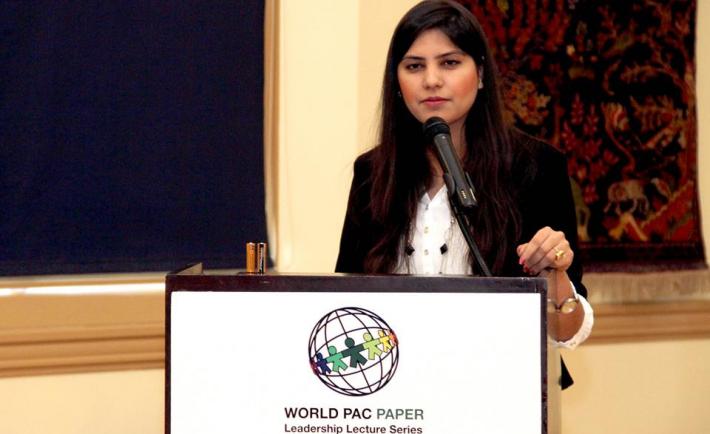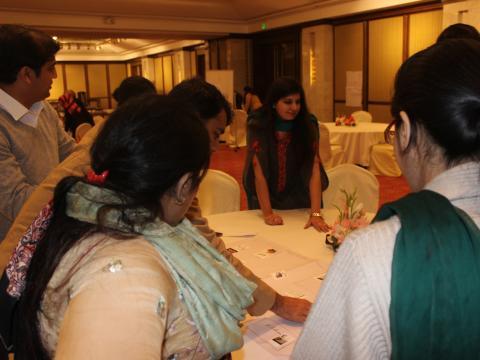
Sehrish Naseem, the 2016 Andi Parhamovich Fellow, at Marietta College Speaking about Young Pakistani Women Leading Transition in Their Society.
One day at breakfast when I was 23 years old I asked my father, “Papa, why is not aunty considering to contest the general elections, even though she is an active member of our community?” A smile appeared on his face and replied, “because if she does our community will stop considering her a woman.”
My aunt was not a politician, but as an opinionated and socially active woman with a deep understanding of the issues facing Pakistan, I thought she should be. This was the moment I came to believe that democracy cannot exist without empowered women. And empowerment comes through women’s access to education, health, and employment because it creates space for them to play an active political role.
As a liberal-minded woman living in a largely conservative society, I struggle to find answers to these questions: If democracy is a name of a system that embodies social equality, then where does my country, Pakistan, stand when only 2.9 percent of women participate in general elections? Why is it that women make up more than half of the country’s population but more than half have been deprived of education? As a woman, I wanted to understand whether a “democracy” is truly democratic if women are systematically denied the power to participate fully in government.
I mustered up my courage and told my father, “Papa, I want to work for women’s empowerment.” I knew from his face that my wish would cause my father a shade of pain, as he would have to justify his decision to support mine to his patriarchal community. Bravely, he said, “Go ahead my daughter, and set a benchmark for women in our community.”
I started my career at NDI to understand, exercise, and deliver an inclusive concept of democracy by maximizing women’s political participation. My work approached the challenge of supporting women’s empowerment and subsequent participation in active politics from multiple angles. The approach begins by first activating a woman’s awareness of her political rights. She must realize that she has the power to be an agent of change in politics, and that her input in various capacities is an indispensable part of the democratic construct. But individual empowerment is futile without corresponding changes to political institutions, which have been stacked against women. Mainstream political parties, for example, must achieve gender balance at all levels in order to provide space for women to become equal participants. Finally, women in politics and those advocating for change from outside the government must work together. By ensuring regular contact at various levels women can build a joint movement to advance social development and inclusive democracy.
This work isn’t without challenges, but the numerous barriers to women’s political participation in Pakistan have never weakened my resolve. I draw strength from the unprecedented efforts of brave Pakistani women who have set a benchmarks for women in their communities. For example, the late Benazir Bhutto, former prime minister of Pakistan; women’s rights advocate Malala Yousafzai; Kalsoom Nawaz, first lady of Pakistan; Speaker Shehla Raza of Pakistan’s Provincial Assembly; National Assembly Member Nafisa Shah; and others whose unfaltering belief in women’s potential is a constant source of hope that my country is on the road to a deeper democracy.
I consider myself extremely fortunate to work with my colleagues at NDI to establish the link between women’s political consciousness and a redefined vision for democracy in Pakistan. Indeed, during my five years at the Institute, I have witnessed remarkable progress as Pakistan is increasingly connected with a global perspective of liberal, all inclusive, objective, goal-oriented, and gender-balanced democracy.

